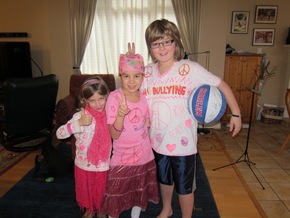 Wednesday, February 27th is anti-bullying and homophobia day, better know as Pink Day. To celebrate, Tennyson will have two assemblies, one at 9:30 am and one at 11:10 am. You are invited to join us. The Global Group will also be selling pink t-shirts ($6.00, available in all sizes) and bracelets ($1.50) from February 25th to 27th. Please join us in celebrating one of Tennyson's core values, respect of others by wearing pink to school. As we are aware, the word bullying has been prevalent in the media as of late. Below is a helpful description of the difference between peer conflicts and bullying. Also, the Ministry of Education has launched a website entitled “Erase Bullying” which has a section for parents. “The goal of Erase Bullying is to ensure that every child in British Columbia feels safe, accepted and respected regardless of their gender, race, culture, religion or sexual orientation” (p.7 of Preventing Bullying & Ensuring Safe and Caring School Communities). And lastly on this topic, “25% of Canadian children and teens have had mean, hateful and threatening things said to them over the Internet or on their cell phone." Ask your child if they are one of them. For information on cyber bullying, visit wiredsafety.org Peer Conflict, Mean Behaviour, and Bullying – What’s the Difference? When a child is having a problem with her or his peers, it can be hard for parents to know what is really happening – is it bullying? Or is it something else? Each type of behaviour must be handled differently, to keep children safe and help them learn how to get along with others.
Peer Conflict Conflict between and among peers is a natural part of growing up. Children will have times when they disagree and can’t solve their own problems. They may even become so frustrated that they say mean things or act out physically by hitting, kicking or trying to hurt. If it’s peer conflict you will be aware that these children:
Adults can respond by helping the children talk it out, and see each other’s perspective. This is often referred to as “conflict resolution”. Mean Behaviour Children may try out behaviours to assert themselves – sometimes saying or doing mean things – such as making fun of others, using a hurtful name, taking something without permission, leaving a child out, or “budging” in line. If it is mean behavior, usually:
When adults see mean behavior they should not ignore it. Adults should respond quickly, firmly and respectfully to stop the behaviour, to let kids know that their actions are hurtful and to re-direct children to more positive behaviour. This quick response stops children from developing a pattern of mean behaviour as their way of interacting with peers, and prevents mean behavior from escalating into bullying. It is a lot easier to correct a child for one nasty comment than to change a pattern of cruelty that grows over time. Bullying Behaviour Bullying is serious behavior that has three key features – all three must be present for the situation to be considered bullying:
The effect on the child who is being bullied is increased fear, apprehension, and distress. Often by the time adults find out about what is happening, the child has tried many ways to stop the bullying but cannot do so on their own. Adults must address the bullying behaviour and ensure the safety of the student who has been targeted. They also need to reassure the children who may have witnessed the behaviour that adults are taking care of it. When schools respond to bullying, staff will also help the child who has been bullying others to take responsibility for their actions, and change their behaviour. They will monitor the situation to ensure the bullying stops, and will support the child who has been bullied to regain confidence and a sense of safety. Staff may follow-up with the students who observed the behaviour to help them learn what to do when they see bullying. The “conflict resolution” style of bringing the children together is not recommended in bullying situations, until considerable time has gone by and all children are feeling safe enough to talk about what happened so that relationships can be healed Comments are closed.
|
Blog SubmissionsPlease send any blog entries to [email protected] (and include a photo if you can). See our blog guidelines.
Blog Archives
June 2024
Blog Categories
All
NewslettersVisit our Newsletters page for the latest school newsletters (and some old ones too)
|

 RSS Feed
RSS Feed
